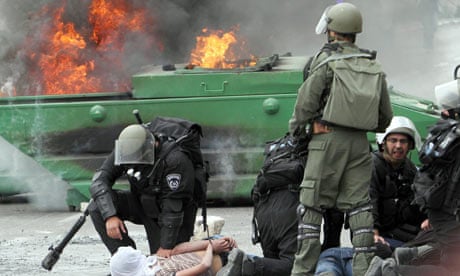The US secretary of state, Hillary Clinton, today demonstrated a new-found steeliness towards Israel by making it clear she was expecting it to back down in the row between the two countries and offer concessions needed for a resumption of Middle East peace talks.
As rock-throwing Palestinians clashed with Israeli forces in Jerusalem in protests dubbed "a day of rage", Clinton sent a double-edged message to Israel.
She softened the tone of remarks coming from the Obama administration over the last few days by talking about the deep bonds between the two countries. But she combined this by firmly placing the onus on Israel to make concessions needed to get the Palestinians back into talks.
Clinton told reporters at the state department that the Israeli prime minister, Binyamin Netanyahu, had to take action to show he was serious about a peace process. She said: "We are engaged in very active consultations with the Israelis over steps that we think would demonstrate the requisite commitment to the process. It's been a very important effort on their part as well as ours. We know how hard this is. This is a very difficult, complex matter. But the Obama administration is committed to a two-state solution."
The rift began last week when the US vice-president, Joe Biden, visited Israel in the hope of getting Israeli-Palestinian peace talks under way. But Israel scuppered the talks with an announcement that it planned to build 1,600 new Jewish homes in East Jerusalem, which the Palestinians hope will one day be their capital. Hours before Clinton spoke Washington demonstrated its anger with the Israeli leader by abruptly cancelling a visit to Israel planned fortoday by the US special envoy to the Middle East, George Mitchell. Clinton has privately set out various demands for Israel, including the cancellation or freeze of planned Jewish homes in East Jerusalem, a promise to engage in talks with the Palestinians on matters of substance, and confidence-building measures such as the withdrawal of Israeli forces from parts of the West Bank and release of Palestinian prisoners.
The steady build-up of pressure on Netanyahu has left him in a bind. If he backs down he is in danger of losing the support of the right in his coalition government. Responding to Clinton, his words did not suggest a readiness to bow to US demands, at least in public. In a statement issued by his office, he said: "With regard to commitments to peace, the government of Israel has proven over the last year that it is committed to peace, both in words and actions."
He cited the removal of hundreds of roadblocks across the West Bank and a temporary freeze on construction of settlements on the West Bank. Middle East analysts in Washington said the Obama administration was not trying to engineer the collapse of the coalition but, if it happened, would welcome a more moderate one that might emerge.
One of the underlying motives of the US resolve to get the peace process moving was offered today by the top US military commander, General David Petraeus, the head of Centcom, which is responsible for the Middle East and Asia. Petraeus told the Senate armed services committee yesterday that the Israeli-Palestinian conflict was a root cause of instability in the Middle East and Asia and "foments anti-American sentiment due to a perception of US favouritism for Israel".
The Israeli government has long objected to being linked to wider conflicts in such a way. Petraeus said there had been insufficient progress towards a comprehensive Middle East peace deal and this "presented distinct challenges to our ability to advance our interests" elsewhere in the Middle East and Asia.
Simmering Israeli-Palestinian tensions erupted into violencetoday with clashes in East Jerusalem after Hamas, the Palestinian Islamist movement, announced a "day of rage" following yesterday's ceremonial reopening of a synagogue in the Old City.
The Palestinian leader Mahmoud Abbas's Fatah movement faced pressure from its own largely defunct military wing, the Al-Aqsa Martyrs' Brigades, demanding to be allowed to resume armed struggle against Israel. It condemned "the ongoing violation of the al-Aqsa mosque".
Israeli forces tightened a blockade on the Old City, particularly the mosque compound. Israel's Ynet website reported 49 Palestinians injured in confrontations with Israeli border guards and police. Palestinian sources said more than 90 people were injured and some 70 arrested.
